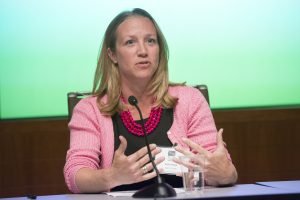A few weeks ago, REACH held our Annual Meeting which featured a panel discussion around promoting healthy relationships and addressing sexual assault on college campuses. We invited follow-up questions and reached out to our panelists for their input. Read on for the questions and the panelists’ answers:
-
Am I correct in thinking that members of a confidential team are not mandated reporters? I recall that Ashleigh mentioned that she maintains a record of general statistics. Does she feel that her counterparts in other schools do the same thing? If not, could there be a degree of under reporting?

Here, it is important to note the difference between “private” and “confidential” reporting designations. Confidential refers to counselors/therapists, ordained chaplains or clergy, and health care professionals who are not required to give any data (truly confidential). The private designation refers to professionals who keep all identifiable information (like a student’s name, for example) confidential, but they do report crime statistics via the Clery Act.
In my role, I report crime statistics based on criminal definitions, but I also keep non-identifiable office data in my possession to understand trends, needs, and usage. Other professionals on other campuses practice various types of data collection and reporting – especially considering that positions similar to mine are housed in many different shops (counseling centers, women’s centers, wellness, health clinic, etc…).
In regards to underreporting, there is certainly a large degree of this across the country. However, I don’t think that this is generally because of reporting designations. More so, I would lean on reporting pipelines, culture around violence and prevention, and general compliance of colleges.
-Ashleigh Hala, Associate Director of Wellness and Director of Sexual Assault Prevention & Response Service, Babson College
-
How does this picture look different in single gender schools? For example, do a greater number of incidents occur off campus? How does this impact Jacqueline’s work when compared to that of a Title IX Coordinator at a co-ed college?
(PLEASE NOTE THAT NOTHING HERE CONSTITUTES LEGAL ADVICE). Unfortunately, being at a women’s college does not shield students from experiencing sexual/domestic violence during their college years. Compared to co-ed colleges, women’s colleges may have a lower proportion of cases implicating their own students, and a higher proportion of reported off-campus sexual assaults (involving accused individuals not affiliated with the institution). However, investigations of potential policy violations against students is only one part of the job. For example, in cases involving non-affiliated accused individuals, my role focuses on support measures for the complainant, which can include helping the student navigate the police reporting process or other campus Title IX process.

However, this is not to say that incidents aren’t happening on campus at women’s colleges. Same sex relationship violence and stalking between students can and does happen (same goes for same-sex sexual violence), and I think there is work to be done to make sure that students in these situations know that they have rights and options too. Also, students can have guests who may assault them or others on campus.
Title IX also applies to sexual harassment (and pregnancy discrimination) cases involving faculty, staff, contractors, and visitors, and even applies to cases between employees. And, it applies to college programs wherever they may be, including study abroad. Plus, legal requirements about training and awareness campaigns for students, faculty, and staff apply to women’s colleges, as do requirements about campus policies–all work that typically falls under the umbrella of the Title IX person.
-Jacqueline Anchondo, Title IX Coordinator and Director of Title IX/Nondiscrimination Initiatives, Wellesley College
-
Karin mentioned the challenging conversations she has had with perpetrators. Is there a counseling service to which these young (mostly) men can turn or be referred? What is the system for working with perpetrators?
Survivors often still love and care for their partners, but want/need them to stop engaging in abusive behavior. I often have survivors tell me that they plead with their abusive partner to seek counseling so that they could get the help and support needed to recognize and change their behavior. Unfortunately, this demands that college counseling staff have training to work with abusers, an area that requires specialty expertise. Our college counseling department works with REACH and receives training from them about how to support survivors, but there are only a few organizations who work directly with abusers. Emerge, led by David Adams, one of 17 state certified “batterer’s intervention” programs, holds abusive partners accountable in a strict 40 week counseling program. We can refer students or students can self-refer but we have found that the academic schedule often creates barriers to students completing the program.

College abusers currently do not receive counseling from their campuses to educate and help them change their behavior. If found responsible under Title IX, they can be suspended or kicked out of school, required to move to other rooms, stay away from and cease contact with their partners as well as other safety and punitive measures. My Title IX Coordinator and I feel that we need to take steps not only to keep the survivor safe but also to both hold the abuser accountable in terms of punishment AND provide some sort of support to help the abusive partner recognize and change their behavior. These are young people who can, and often want to, change their behavior but this type of programming needs to be developed by those with expertise in batterer’s intervention and domestic violence.
As we speak, Lasell College, REACH and other domestic violence organizations are meeting with David Adams at Emerge to think about what model would best serve college age abusers. As Title IX is applied more on campuses, colleges will begin to elevate and refine their responses to both survivors and abusers, and with that, we hope a movement will emerge to not only punish but educate abusive students so that they graduate from our educational institutions with information, a sense of accountability and the power to change their behavior.
-Karin Raye, Community Activist and Assistant Professor, Lasell College
-
If Title IX directors/coordinators are not required to report to the police, wouldn’t that make them accomplices to the crime?
An accomplice is a person who participates in a crime. Receiving information about a possible crime does not equal participation in said crime.
-Jennifer O’Keefe, Director of Legal Affairs and Title IX Coordinator, Lasell College
I would shift away from the idea of “accomplices to the crime” and move towards “allies with the survivor and/or a survivor and trauma centered practice/procedure”. If we focus on what Title IX folks are mandated or obligated to do, we see that the student or survivor is given access to choices, options, resources, and rights. This information allows the student to make a decision on their own at any time (acknowledging that there is no statute on a college campus for reporting).
-Ashleigh Hala
If you have additional questions or want to learn more about REACH’s work to promote healthy relationships on college campuses, please check out our Prevention Programs and email us for more information.





